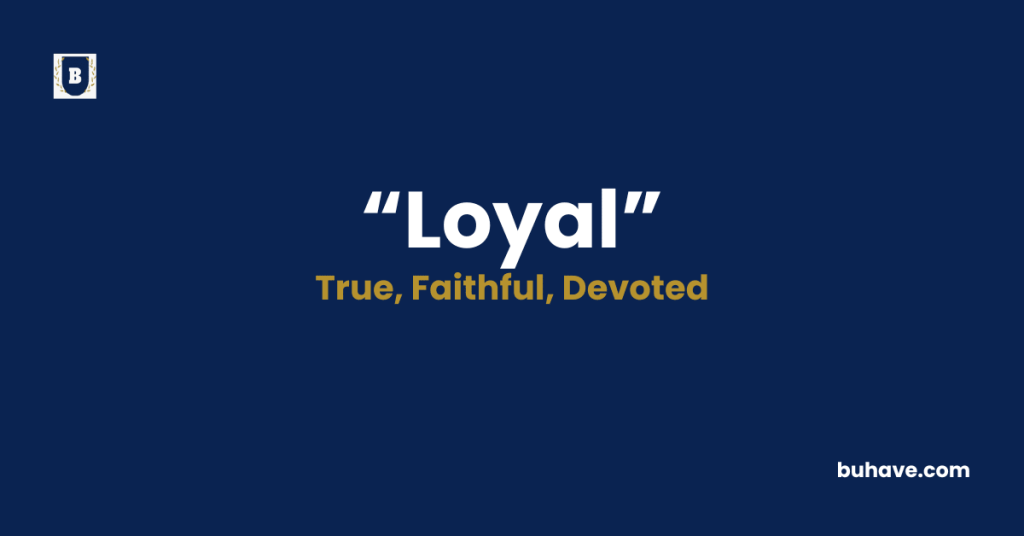The word ‘Loyal’ (Adjective) describes a person or quality that shows firm and constant support or allegiance to someone or something. At first, people used the word to highlight strong personal bonds built on trust and faithfulness. in this guide, you’ll learn the full definition, synonyms, antonyms, etymology, and real-life examples of how to use ‘Loyal’ correctly in sentences.
Loyal Explained in Depth
A complete and detailed guide to the words Loyal including meaning, definition, examples, etymology, synonyms, and antonyms.
Meanings of Loyal
Loyal means staying true, supportive, and faithful to someone or something, even during difficult times. At first, people often use this word to describe strong and lasting bonds between friends, family members, or even between a person and a cause. In addition, loyalty shows up through actions that prove trust, dedication, and consistency over time. Moreover, being loyal means that a person does not easily give up or abandon those they care about, even when faced with challenges or temptations. Eventually, loyalty grew to symbolize not just personal relationships but also commitment to ideas, organizations, or even nations.
Today, when someone describes a person as loyal, they highlight a rare and admirable quality of standing firm with honesty, love, and respect.
Definition:
Loyal describes a person or quality that shows firm and constant support or allegiance to someone or something. At first, people used the word to highlight strong personal bonds built on trust and faithfulness. In addition, loyalty often involves staying true even when situations become difficult or uncertain.
Moreover, loyal individuals continue to protect, respect, and stand by others without wavering. Eventually, the meaning of loyal expanded to include devotion to causes, communities, and beliefs. Today, when someone calls a person loyal, they emphasize a deep sense of commitment, reliability, and unwavering dedication that remains strong over time.
Etymology:
The word “loyal” carries a rich and honorable history. Originally, it came from the Old French word “loial,” which meant “faithful” or “true.” At first, the French term itself came from the Latin word “legalis,” meaning “according to the law” or “lawful.” In addition, during medieval times, people often linked loyalty to legal obligations, suggesting that being loyal meant doing what was right and lawful. Moreover, as the word moved into English around the 14th century, it began to take on a deeper emotional meaning, connecting loyalty not just to laws but also to personal relationships and heartfelt devotion. Eventually, “loyal” grew to describe a powerful and lasting sense of faithfulness toward people, ideals, and communities.
Today, when someone uses the word “loyal,” they speak to a beautiful tradition of standing firm, staying true, and honoring commitments across time and challenges.
Example Sentences:
- First, she remained loyal to her best friend, even when others turned away.
- Mover, the loyal dog followed his owner everywhere, showing endless devotion.
- Meanwhile, he stayed loyal to his values, despite facing heavy pressure to change.
- In addition, the team’s loyal fans cheered louder than ever after the difficult loss.
- Finally, through every challenge, they proved loyal to their mission and their dreams.
Loyal Synonyms:
- Faithful
- Devoted
- Trustworthy
- Steadfast
- Dedicated
- Dependable
- Allegiant
- Constant
- True-hearted
- Committed
Loyal Antonyms:
- Unfaithful
- Disloyal
- Treacherous
- Untrustworthy
- Fickle
- Betraying
- Unreliable
- Inconstant
- Deceitful
- False-hearted
FAQs about Loyal
Here’s a FAQ-style guide about the word “Loyal”
1. What does “loyal” mean?
Loyal refers to showing firm and constant support or allegiance to someone or something—such as a person, cause, organization, or belief.
2. What are common examples of loyalty?
- A friend who stands by you during tough times
- An employee who stays committed to a company for years
- A customer who repeatedly chooses the same brand
- A partner who remains faithful in a relationship
3. How is “loyal” different from “faithful”?
Both involve commitment, but:
- Loyalty is broader—it can refer to devotion to a cause, group, or person.
- Faithfulness often has romantic or religious connotations and emphasizes consistency in keeping promises or vows.
4. Is loyalty always a good thing?
- Generally, yes—but loyalty can become unhealthy if:
- It leads to blind support (ignoring wrongdoing)
- It keeps you in toxic relationships or unwise commitments
- Healthy loyalty is earned, balanced, and based on mutual respect.
5. What are synonyms for “loyal”?
- Devoted
- Committed
- Faithful
- Steadfast
- Trustworthy
- Allegiant
6. How is loyalty valued in relationships and friendships?
Loyalty builds trust, security, and emotional connection. A loyal friend or partner is seen as dependable, someone who won’t betray or abandon you.
7. What does brand or customer loyalty mean?
In business, brand loyalty refers to customers who consistently choose one company over competitors, often due to positive experiences, quality, or emotional connection with the brand.
8. Can animals be loyal?
Yes! Animals—especially dogs—are often described as loyal due to their strong bonds, protective nature, and consistent affection toward their owners.
9. How can someone show loyalty?
Keeping promises
- Standing by someone during adversity
- Defending someone’s reputation
- Supporting a group or cause over time
- Being honest and dependable
Explore more L words:

















